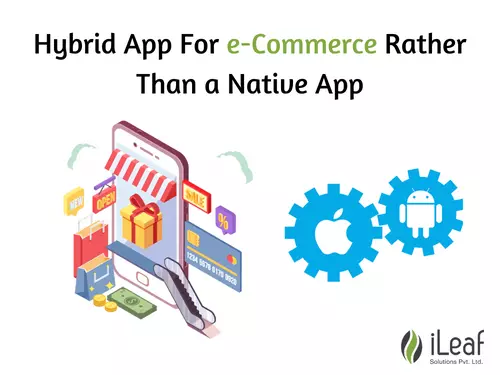Unlocking the Potential of Mobile Applications: Hybrid vs. Native App Design

In today's smartphone era, mobile applications, commonly known as apps, have become an integral part of our daily lives. With the continuous evolution of mobile hardware and software, apps are being developed worldwide to overcome real-life barriers and simplify complex tasks. However, app design is often overlooked or taken for granted by the average consumer. Designing an app is easier said than done, and there are several critical aspects that, if not handled well, can backfire against its purpose. It's important to understand that not all apps are designed in the same way.
At iLeaf Solutions, we prioritize customer service and satisfaction. To achieve this, we believe it's crucial for our clients to fully understand the scope and options we provide. In our previous blog post, "10 Reasons Why You Should Invest in an E-Commerce Mobile Application to Boost Your Business," we outlined the various benefits of having an E-Commerce Mobile Application for your business. In this article, we aim to enlighten you further on the different types of apps based on their design and why a hybrid app design using the latest technologies would be more resourceful than a native app design.
Hybrid App or Native App: Which One Do You Need?
Let's explore the differences between native and hybrid applications. A native app is designed specifically for a particular operating system (OS) such as Android, iOS, or Windows. During the development process of a native app, the coding is directly related to the mobile device's operating system. For example, an app developed for iPhones utilizes coding specific to iOS, and the same goes for other operating systems. Native applications are created for a single platform and leverage the full potential of the device's features.
On the other hand, hybrid apps are designed to utilize web development tools and coding, which are not employed in native app design. As the name suggests, hybrid applications are developed under the umbrella of the operating system but predominantly using modern web development tools and software. They are designed to run on various platforms and are written in languages like HTML5, CSS, or JavaScript. These apps are neatly encapsulated by a native container, allowing them to function across multiple platforms, including iOS, Android, Windows, and Blackberry.
Before we delve deeper into the different types of app design, it's important to briefly touch upon web apps and their relation to native and hybrid apps. Contrary to what their name implies, web apps are not real applications but rather websites that look, feel, and operate similarly to native apps. These apps gained popularity with the advent of HTML5, as clients realized that native app-like functionality could be achieved and offered through a browser. With the increasing number of websites running on HTML5, it has become challenging to distinguish between web apps and native apps. Hybrid apps can be seen as a fusion of native and web apps, where the browser is embedded within the application itself.
Advantages of Native Applications
Native applications designed for your E-Commerce platform offer numerous advantages. They are generally responsive, efficient, and closely aligned with the respective operating systems. Native apps also benefit from the complete support of major OS players like Apple and Google, which allows for creativity, innovation, and the potential to revolutionize the app market. As they are specifically tailored to the dedicated OS, they seamlessly adapt to the user interface (UI), providing users with a simple and user-friendly app operation. Additionally, native apps offer enhanced security, reliability, and the ability to provide an accessible offline mode.
Disadvantages of Native Applications
Unfortunately, dedicating yourself to a native mobile application and expanding it across both iOS and Android can be costly. It requires the establishment, funding, and maintenance of separate development teams for each OS, which significantly drives up the app's development cost. Moreover, the app's response to various platforms and different OS can be unpredictable, as its implementation and development algorithms vary. This necessitates complex coding and a lengthy app development time, both of which hinder the speed and increase the cost of app development.
Advantages of Hybrid Applications (Flutter or React Native)
At iLeaf Solutions, we advocate for hybrid app development (using frameworks like Flutter or React Native) as it provides our clients with quick, easy, flexible, and cost-effective long-term solutions. One of the major contributing factors is the coding aspect. Developing hybrid apps only requires basic knowledge of web development languages such as HTML, CSS, JavaScript, or Typescript, along with expertise in the targeted mobile OS. Most front-end developers already use frameworks and libraries for web development, which can be leveraged for hybrid apps. This translates to fewer resources being allocated to work on multiple platforms, resulting in reduced development costs and time savings.
Disadvantages of Hybrid Applications
To be objective, it's important to address the disadvantages of opting for a hybrid E-Commerce mobile application for your business. Hybrid apps are often less efficient in terms of responsiveness compared to native applications. Their development relies primarily on web development coding, such as HTML, CSS, and others, which may not deliver the most seamless and user-friendly experience that users expect.
Conclusion: Hybrid App or Native App?
In general, hybrid mobile apps are a more cost-effective solution and are favored by small businesses, companies, and individuals looking to expand their market and boost revenue through E-Commerce while working within a limited budget. Opting for a hybrid app is a sound investment, as it closely resembles its native counterpart, albeit running on a web engine. Although each type of app design has its pros and cons, the choice ultimately depends on the specific requirements of your app. Armed with this knowledge, we hope you can make an informed decision that aligns well with your business model.
At iLeaf Solutions, we are committed to providing our clients with the best possible app development solutions. Contact us today to explore the world of hybrid app design and unlock the true potential of your mobile app platform.














